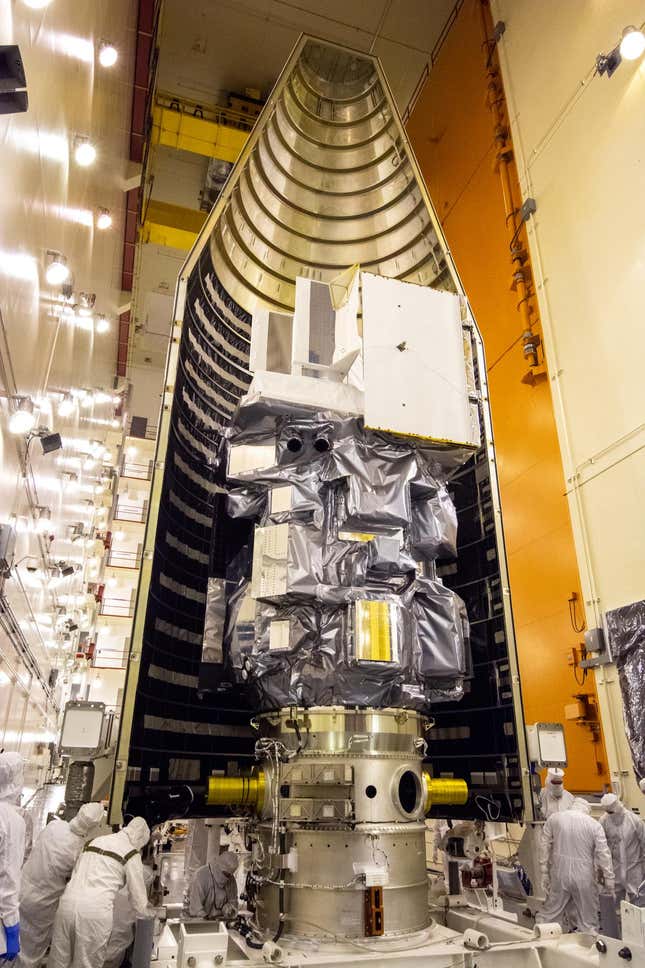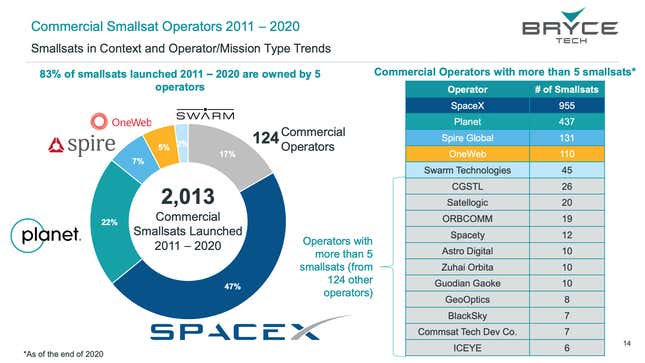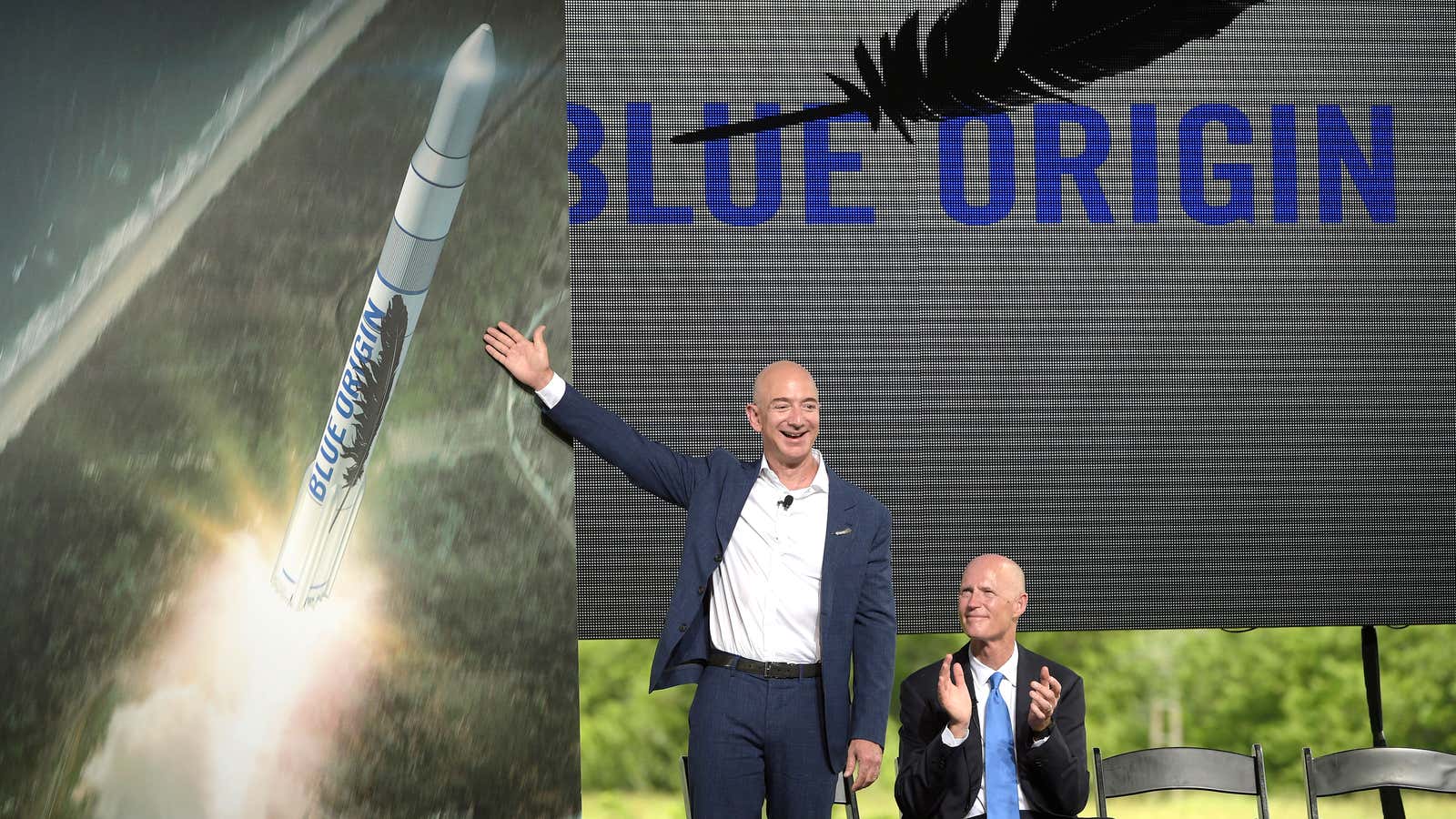Dear readers,
Welcome to Quartz’s newsletter on the economic possibilities of the extraterrestrial sphere. Please forward widely, and let me know what you think. This week: Blue Origin vs. NASA, SmallSat facts, and a SPAC check.
🚀 🚀 🚀
When the existence of Blue Origin was first revealed by reporter Brad Stone in 2003, four years after the secretive start-up was founded, Jeff Bezos wouldn’t comment on his space company directly. Instead, he issued a pean to the National Aeronautics and Space Agency (NASA), that premiere purveyor of final frontier exploration.
“NASA is a national treasure, and it’s total bull that anyone should be frustrated by NASA,” the mogul wrote in an email to Stone. “The work NASA does is technically super-demanding and inherently risky, and they continue to do an outstanding job. The ONLY reason any of these small space companies have a chance of doing ANYTHING is because they get to stand on the shoulders of NASA’s accomplishments and ingenuity.”
Well, Bezos is now frustrated by NASA. Last week, Blue sued the space agency in federal court, arguing that it inappropriately awarded a multi-billion dollar contract for a lunar lander to Blue’s chief rival, Elon Musk’s SpaceX. Blue’s initial challenge to that decision was rejected by the Government Accountability Office, which found that NASA had not played favorites in choosing just one contractor due to lack of funding for two.
Lawsuits between contractors and the government aren’t uncommon. In a way, they’ve helped define the rise of commercial space companies and SpaceX itself. But it’s worth looking at how this challenge diverges from others that arguably opened up low-earth orbit for business.
SpaceX sued NASA in 2005, before it even launched its first rocket. At the time, another nascent rocket maker, Kistler Aerospace, was on the verge of bankruptcy. It suddenly received a $227 million NASA contract to share its test data with the government. SpaceX challenged the case, arguing that if the government wants commercial rocket test data, it should accept competitive bids, not hand a contract to a company led by a former high-ranking NASA official. NASA withdrew the contract with Kistler.
Nine years later, in 2014, SpaceX sued the government again; this time challenging the US Air Force’s decision to award a multi-launch contract to United Launch Alliance (ULA), the Boeing and Lockheed Martin joint venture that held a monopoly on US government spaceflight. (SpaceX had also challenged the creation of that monopoly in 2006.)
Again, SpaceX framed its challenge as a demand for fair competition that would benefit the government as well as its own bottom line. Much of that litigation is still sealed due to national security concerns and proprietary corporate data. But the ultimate outcome was a settlement that allowed SpaceX to begin bidding on military launches and break ULA’s monopoly in 2015.
These cases helped create an environment where NASA and the US military are more willing to use open bidding for contracts that might previously have been awarded with much less transparency.
For one example, consider SpaceX’s most recent litigation with the government: In 2019, it sued the US Air Force after the branch awarded development funding for future military rockets to three competitors—Blue Origin, ULA, and Northrop Grumman—but not SpaceX. Musk’s firm lost that challenge, with the court finding in a sealed ruling that the Air Force had not erred in selecting among the competing bids.
Musk had wanted that funding for his next-generation rocket, Starship, but Air Force officials ultimately felt that vehicle was too advanced. In the end, the military would choose SpaceX and ULA for its next set of military launch contracts, and SpaceX didn’t challenge that result even though it got a smaller share of the contract. Starship, meanwhile, was chosen this year by NASA to bring astronauts back to the moon, which led to Blue Origin’s challenge.
There is a distinction between suing for the right to compete and suing for not winning the competition, and it’s true that the line can be blurry. Given that Blue’s proposal would cost $3 billion more than the one from SpaceX (although Bezos is offering to cover an additional $2 billion in costs), the perception in the aerospace world right now, even among some Blue Origin employees, is that the firm is taking a scorched earth approach.
That’s particularly because the company’s spokespeople have labeled the agency’s decisions reckless and unsafe. It’s a different style of rhetoric than even Musk has used when furious about government decisions: He has alleged corruption and lambasted officials for wasting money or not pursuing the most innovative technology, but he hasn’t suggested they are risking lives.
🌘 🌘 🌘
Imagery interlude
The LandSat program is the longest continually running effort to examine the earth from space, and its ninth satellite will be launched next month. Here’s a look at the beast as it gets tucked into its rocket faring:

LandSat’s data has not only proven hugely valuable to scientists in dozens of disciplines, it also has been the foundation of efforts to train machine learning algorithms to detect objects and changes to the planet. (It also, per NASA, helped one biologist discover some new animal species.)
📩 📩 📩
Quartz has a new set of weekly emails for our members. We think they’ll do a better job of getting our best work in front of you with minimal fuss. I’m most excited about the Forecast, our examinations of new ideas in the world. I’ll be writing some future editions, but check out this week’s on the topic of…
Can crypto go green?
Prices for the cryptocurrency bitcoin are surging again, and energy experts know what that means: Carbon emissions from bitcoin “mining” are about to take off, too. Today, the carbon footprint of bitcoin is comparable to that of a major city. But there are ways for bitcoin to go green—and miners could have a financial stake in doing so.
✦ Find out what’s in store for low-carbon crypto in this week’s The Forecast email, available to Quartz members.
🛰🛰🛰
Space debris
Small but mighty. The folks at Bryce Space and Technology released a new report on small satellites (that’s anything with a mass less than 600 kg, or about 1,320 lbs.) and it is full of interesting facts. This chart in particular struck me:

Of the Big Five, two firms are going public—Spire began trading this week as SPIR on the New York Stock Exchange, while Planet will complete its SPAC transaction later this year. Meanwhile, SpaceX just bought Swarm, leaving it and OneWeb as the two largest privately-held small satellite operators.
SPAC Check. Spire’s deSPAC transaction—when investors in a special-purpose acquisition company (SPAC) give final approval to a reverse merger with a private company—went smoothly, although the company said 90% of its retail investors chose to take $10 payouts instead of owning shares in the newly public firm. That might have been the right move: Currently, shares in the stock trade at $9.90.
Shares in other newly deSPAC’d space firms aren’t doing too much better: Momentus (MNTS) is trading at $8.82; AST Space Mobile (ASTS) sits at $8.55; Astra Space (ASTR) at $9.93. To be fair, many of these firms have yet to fulfill the promise of their prospectuses, which explains why they are sitting below that $10 a share floor. The one exception? Virgin Galactic (SPCE), which sits at $25.25. Virgin hasn’t exactly met its targets, either, but flying founder Richard Branson to space in June clearly put some gloss on the company. Next up? Rocket Lab and Planet.
Goodnight, sweet prince. A 15 year-old Malaysian satellite that failed this summer will be de-orbited; the exact cause of what disabled the Boeing-built spacecraft is unknown but may have to do with running out of propellant faster than expected.
Starliner woe. Boeing had to bring its troubled astronaut-carrying spacecraft back to the factory to solve a critical problem with the vehicle’s propulsion system; a long-awaited test flight is likely to be delayed until 2022.
Roll call count-off 👏 👏 👏 👏. Former Blue Origin and SpaceX engineer Lauren Lyons will be the new COO at small rocket maker Firefly. Former USAF General Mark Baird will lead Virgin Orbit’s government service subsidiary. Former NASA administrator Charles Bolden will join the board of controversial telecom Ligado.
Symposium! Space industry machers gather in Colorado Springs next week for the annual Space Symposium. I’ll only be there in spirit (and on Zoom) so I’m counting on my beloved readers to hit me up with their observations and anecdotes.
Your pal,
Tim
This was issue 104 of our newsletter. Hope your week is out of this world! Please send theories on Blue Origin’s HLS lawsuit, pictures of Space Symposium hijinks, tips, and informed opinions to [email protected].
